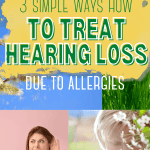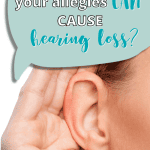If you’ve recently noticed a change in your hearing, it may be due to seasonal allergies. Here’s how to treat hearing loss due to allergies to improve your allergy symptoms and your hearing.
Are you suddenly experiencing some hearing loss?
If it’s allergy season, your hearing loss could be related to an allergic reaction.
It’s frustrating when your ears start to feel clogged and muffled! But fortunately, allergy sufferers can use these three simple self-care activities to relieve their symptoms and return to normal hearing levels. Three self-care activities include taking over-the-counter medications, removing allergens, and reducing your allergen exposure. I’ve listed a few other simple home remedies which may also be helpful.
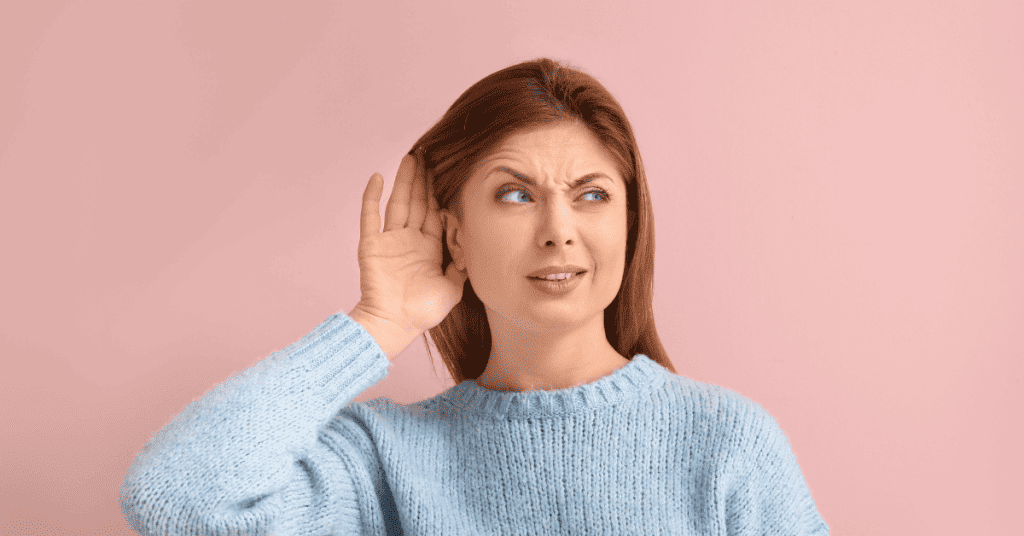
Exhausted & Overwhelmed?
This Self-care Starter Guide will show you 3 simple steps to take RIGHT NOW to take better care of yourself. Be sure to grab yours! Get your FREE copy of the Self-care Starter Guide HERE!

How Seasonal Allergies Can Affect Your Hearing
While some people find allergy season a slight nuisance, others experience a severe impact and endure an allergic response.
When allergy season is in full bloom (note high pollen counts), with pollinating flowers, weeds, and trees (spring allergies) and hay fever in the early fall (in the USA), we see many people exhibiting allergy symptoms – probably you included.
But not everyone has trouble during allergy season—only those with allergic rhinitis, which is an allergy to pollen and other seasonal irritants.
An allergy occurs when your body reacts to something it perceives as a threat (but isn’t a threat to all people) by your immune system. In response to the threat, a release of histamine occurs and contributes to the most common allergy symptoms which include:
- Watery eyes
- Itchy eyes
- Runny nose
- Sore throat
- Nasal congestion
Some people can have lesser-known symptoms like a feeling of fullness, a feeling of pressure in their ears, or they may feel like their ears are clogged. Allergies can also cause:
- Itchy ears
- Ear pain
- Feeling dizzy
- Dry mouth
- High blood pressure
- Snoring and sleep apnea
- Temporary hearing loss
- A worsening of pre-existing conditions, including tinnitus.
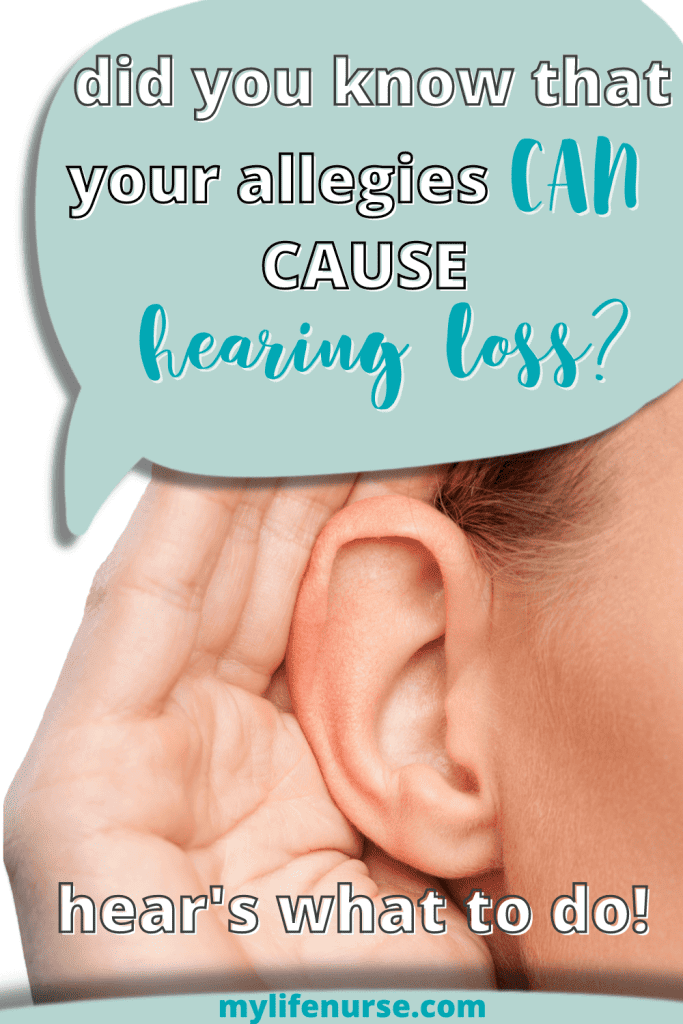
Causes of Allergy-Related Hearing Loss
The causes of allergy-related hearing loss occur for different reasons, depending on which area of your ear is affected. The middle ear is most likely to be affected by seasonal allergies but allergies can affect all areas of the ear.
Outer Ear
An allergic skin reaction can cause your outer ear and ear canal to feel itchy and swollen (otitis external). Your reaction could be from seasonal allergies, but it could also be due to environmental allergens like:
- Laundry detergent
- Fragrance
- Earrings – if you wear them
Pet dander can be a common source of ear discomfort
Other causes for your ear allergies could be:
- Food allergies
- Animal dander (especially household dogs and cats)
- Chronic skin diseases like psoriasis or eczema
- Ear wax blockage
- Contact dermatitis from irritants
- Irritation from hearing aids
Middle Ear
Your middle ear is most commonly affected by reactions to seasonal allergies. During a reactive histamine release, swelling in the tube that connects the back of your throat to your nose and ears (the eustachian tube) can occur.
This inflammation typically causes eustachian tube dysfunction preventing normal fluid drainage and resulting in a fluid build-up, pressure, a feeling of fullness within your ear, and sometimes even a sensation that you need to ‘pop’ your ears.
These symptoms can:
- interfere with your balance
- cause dizziness
- difficulty hearing properly.
Unfortunately, these symptoms can also lead to middle ear infections (called otitis media), so it’s important to seek medical advice and see your healthcare provider for an antibiotic, particularly when you notice a change in your sense of hearing or balance, or experience pain in your ear.
Inner Ear
If you have an inner disease called Meniere’s disease, you may experience frequent changes to your balance and hearing loss. You likely have even more frequent changes when you are dealing with your allergy symptoms.
The swelling or excess fluid can result in pressure, which gives you that feeling like your ears are blocked.
This condition is called conduction hearing loss and typically resolves itself when your allergy symptoms resolve.
Allergy Symptom Related Posts:
What To Do For Dry Mouth Caused By Allergies
Allergies Cause High Blood Pressure: How to Lower Your Risk
How to Stop Snoring and Sleep Apnea When Allergies Cause Snoring
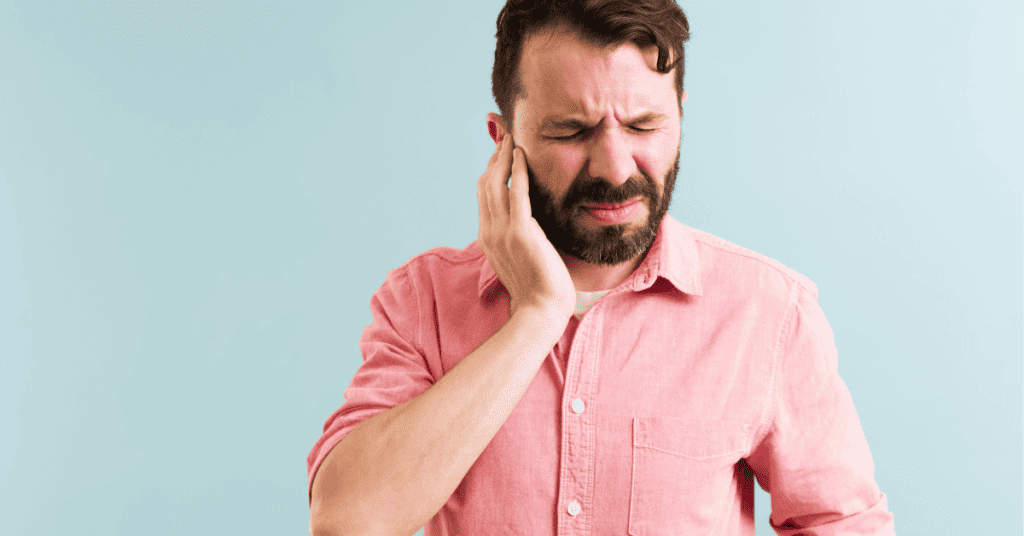
3 Simple Ways How to Treat Hearing Loss Due to Allergies
Although hearing loss due to allergies can be inconvenient, the good news is that most people do not have permanent hearing loss.
Allergy reactions are typically seasonal so when the airborne allergens clear from the air, your allergy symptoms, including the:
- fluid buildup in your ear,
- sinus pressure
- hearing loss
- tinnitus symptoms
all usually resolve on their own.
In the meantime, listed below are 3 simple self-care activities you can do to help alleviate your hearing loss.
Looking for a way to stay motivated about taking better care of yourself? Check out my Bible study by clicking this link.

3 Self-care Solutions: How to Treat Hearing Loss Due to Allergies
1. Try Over-the-Counter Antihistamines
Antihistamines (typically taken as pills or a nasal spray) can block the body’s reaction to the allergen(s) and temporarily reduce the swelling and possibly also alleviate hearing loss.
It will require taking this medication daily, but if your hearing loss is minor and due to seasonal allergies, taking these medications for a short time can usually be effective.
However, be sure to follow up with your healthcare provider for guidelines on the long-term use of over-the-counter medications. Some allergy medications are only meant to be used on a short-term basis and your provider may have a safer and more effective suggestion for you to use for long-term treatment.
Research shows appropriate treatment of allergic rhinitis may decrease the need and frequency of surgical procedures and may also reduce the costs associated with hospitalization. (source)
Also, proper administration of nasal sprays is essential for an effective response to allergy treatment.
The best way to administer your nasal spray is to look down and squirt the nasal spray just inside your nostril aiming toward the outer walls on both sides. Then wait, and do not take a deep breath or sniff hard after spraying to allow time for the medication to be properly absorbed. (source)
2. Remove the Allergens (Off of You)
There are several different ways to remove the allergens.
It’s always a good idea to take a hot shower after you spend time outdoors during allergy season. Washing the allergens out of your hair and off your body is an easy but effective way to reduce your allergy symptoms, especially before bed.
Plus, inhaling the steam (or menthol) in the shower can help to relieve the pressure in your middle ear as it opens the eustachian tube and drains built-up fluid.
Using a neti pot or saline sprays while in the shower can also reduce levels of histamine when used correctly. (source)
3. Intentionally Reduce Your Allergen Exposure
Be intentional (maybe even passionate!) about reducing your exposure to your allergy triggers during allergy season.
If pollen is your main allergy irritant here’s how you can reduce your reactive symptoms:
- Keep your windows closed when allergy pollen counts are high, on windy days, and when it’s humid outside.
- Avoid fresh-cut grass or flower gardens.
- Use an air purifier to improve the quality of your air indoors.
- Routinely clean and dust your indoor space.
- Use a HEPA filter when cleaning to remove more allergens.
Avoiding pollen is a great place to start but obtaining an allergy test by seeing an allergy doctor is the most effective way to know which allergens to avoid.
4. Bonus Tip – Try These Home Remedies
Here are some additional home remedies to help you relieve the symptoms of hearing loss due to seasonal allergies.
- Wash your ears! During allergy season, wash your ears daily with warm, soapy water and dry them thoroughly.
- Yawn or chew gum. You can do this to see if you can equalize the pressure in your ears (make your ears pop).
- Use heat. Place a warm compress on the affected ear for a few minutes daily.
Remember, never insert anything into your ear canal.
When to See Hearing Health Professionals
Most people can expect their hearing loss to resolve.
But, if you still have hearing loss, consider seeking medical attention one to two weeks after the allergy season has passed.
Hearing care specialists or an ear, nose, and throat (ENT) provider can determine the cause of your hearing loss and offer a variety of ways of treatment.
For some people who have severe allergic reactions or allergies that extend outside of the allergy season, the most effective long-term solution is obtaining a series of allergy shots or oral drops.
The good news is most of the time, allergy symptoms, including a decrease in hearing are typically temporary. Normal hearing typically returns after your symptoms resolve or your infection clears.
Don’t forget your FREE Self-care Starter Guide! Get it HERE.

FAQs for Simple Ways How to Treat Hearing Loss Due to Allergies
Q1 What Are Types of Allergy-Related Hearing Loss?
Fullness – an excess amount of fluid in the ear creates pressure or a feeling that the ear is clogged. When the fluid presses against the eardrum, it can feel uncomfortable and impair hearing. Ear pain can be a sign of an infection and may require medical attention for treatment.
Conductive Hearing Loss – occurs when sound waves cannot flow properly through the ear and into the tiny bones of the middle ear. Interference from excess fluid or ear way may impede the sound traveling to the cochlea.
Although curable, any may naturally improve, determination of whether the hearing loss is temporary, curable, or permanent usually requires specialized testing by a hearing care provider. If you notice a sudden hearing loss, schedule an appointment right away.
Tinnitus – a rushing, humming or ringing sound you hear even though there is no external noise causing it. Tinnitus is not a condition, it’s a symptom of an underlying cause such as hearing loss, ear injury, or a nervous symptom disorder. When tinnitus is associated with other allergy symptoms, it’s usually a temporary symptom related to inflammation or fluid buildup.
Q2 What if You Have Seasonal Allergy Symptoms and Hearing Aids?
Allergens can also clog the microphone ports in hearing aids, interfering with how your hearing aids function. The covers of the microphone ports can be easily replaced. Be sure to clean your hearing aid regularly during allergy season.
Talk to your hearing health professional if you believe you have an allergy to your hearing aids. The allergy can be related to poor fit, excess moisture in the ear, a build-up of wax, dry skin, or an allergy to the material the hearing aid is made from.
Hearing aid manufacturers have options for people such as hypoallergenic shell materials or special coatings.
Thanks for reading! Know someone who would benefit from reading this post? Share it on social media!

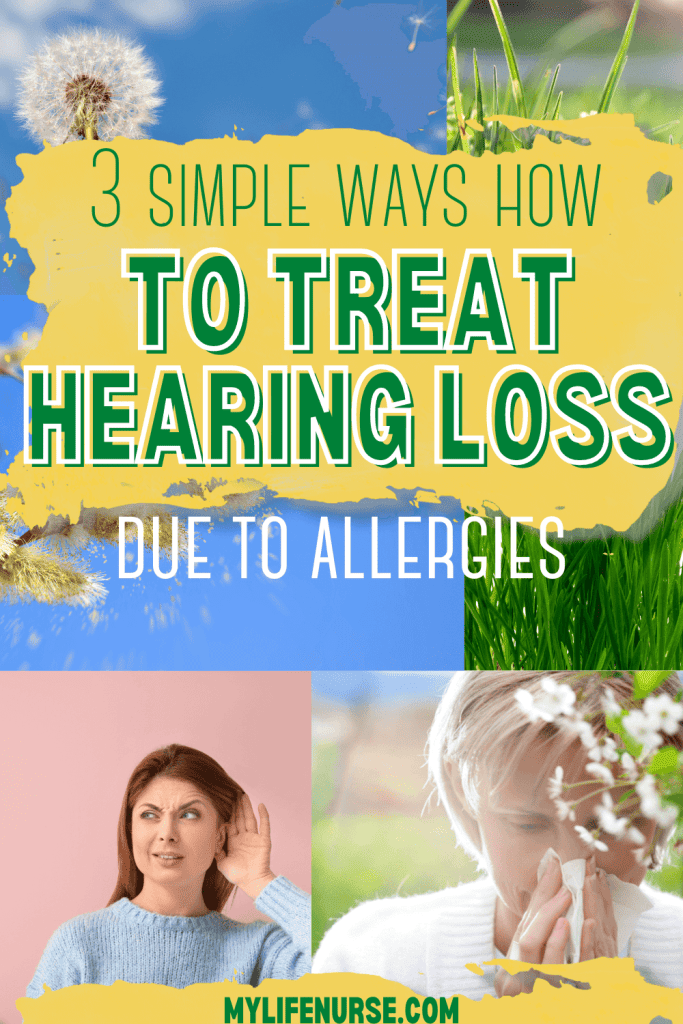
Ready for more? Here are my latest posts!
- 9 Must-Read Blog Posts to Manage High Blood Pressure Naturally
- Overcome Self-care Barriers with 4 Easy Tips
- 4 Easy Ways to Get Your Spouse to Eat Healthy Food
- 5 Easy Ways to Find Me-Time in Your Busy Schedule
- How to Try New Vegetables When You Hate to Eat Veggies

Be sure to grab your FREE Self-care Starter Guide! Lisa Kimrey is a 33-year veteran registered nurse (RN), speaker, and author of the Bible study, The Self-care Impact: Motivation and Inspiration for Wellness. At Mylifenurse, Lisa combines her nursing expertise with Scripture-based encouragement to show readers who serve and care for others how to begin and maintain their self-care journey – without feeling guilty or overwhelmed – to feel happy, healthy, and rejuvenated.
